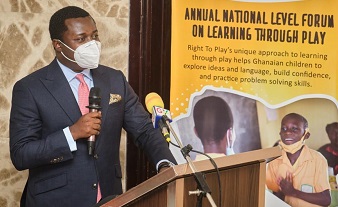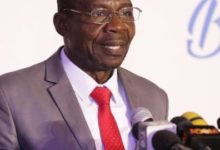National Standardised Test for basic 4 pupils will identify challenges in educ system – Ntim Fordjour

The Deputy Minister of Education, Reverend Ntim Fordjour, has said the National Standardised Test for basic four pupils in the public schools is to diagnose the weaknesses in the education sector, following the introduction of the new curriculum.
He explained that the test, which is scheduled for December 17, 2021, was part of government measures to identify the challenges in the basic level, especially in areas of numeracy and literacy for redress through the Ghana Education Service (GES).
Reverend Fordjour said this last week Friday in Accra, at the annual level learning forum organised by Right To Play and the Ministry of Education to discuss the importance of play in teaching and learning.
The forum was attended by policymakers, educationists, teachers, parents/caregivers and Ghanaians in general.
Reverend Fordjour said research work carried out in 2015 revealed that only two per cent of children averagely around the age of 10 in basic schools could proficiently read.
“Subsequently, the World Bank did a survey and determined that in low income countries, and of course where Ghana also forms a part, 83 per cent of learners at the age of 10 were not able to read for understanding.
If we are to conduct that same survey today, the numbers will possibly be higher. This indicates the need to build the learners’ numeracy and literacy level which forms the core foundation of quality education,” Reverend Fordjour had said.
He noted that the National Standardised Test was not meant to assess the performance of teachers or compare schools’ performances, but was meant to focus on the learner to diagnose their weaknesses.
“After the test, the feedback would enable the Ministry and GES in using the necessary policies and interventions to address them. I must commend Right To Play for their tremendous contributions for ensuring quality teaching and learning in our education sector,” Reverend Fordjour said.
The Country Director for Right To Play, Madam Josephine Mukakalisa, reiterated the need to combine learning and play for children, especially to understand what they are being taught.
She said playing should not be seen as leisure activities, as through playing children naturally learn and acquire information by implementing with their bodies, objects, symbols and environment.
Madam Mukakalisa said Right To Play was harnessing sport and play to protect, educate and empower the world’s most vulnerable children, and commended GES for the solid collaboration so far.
BY BERNARD BENGHAN






